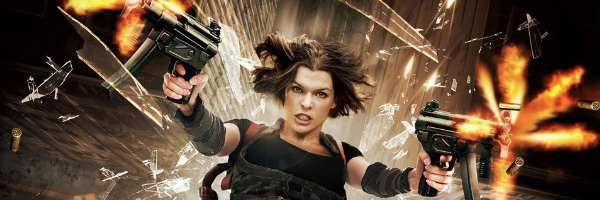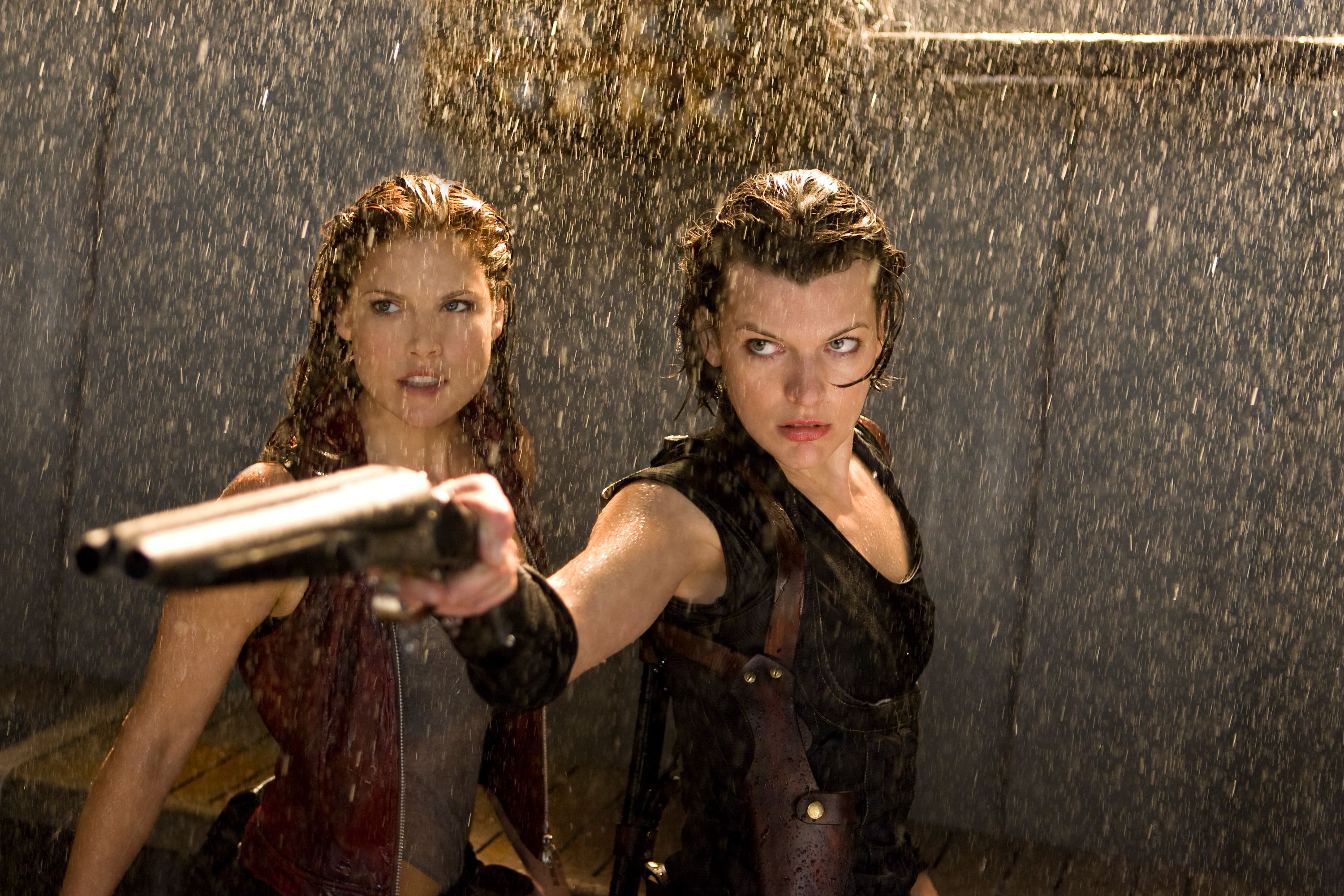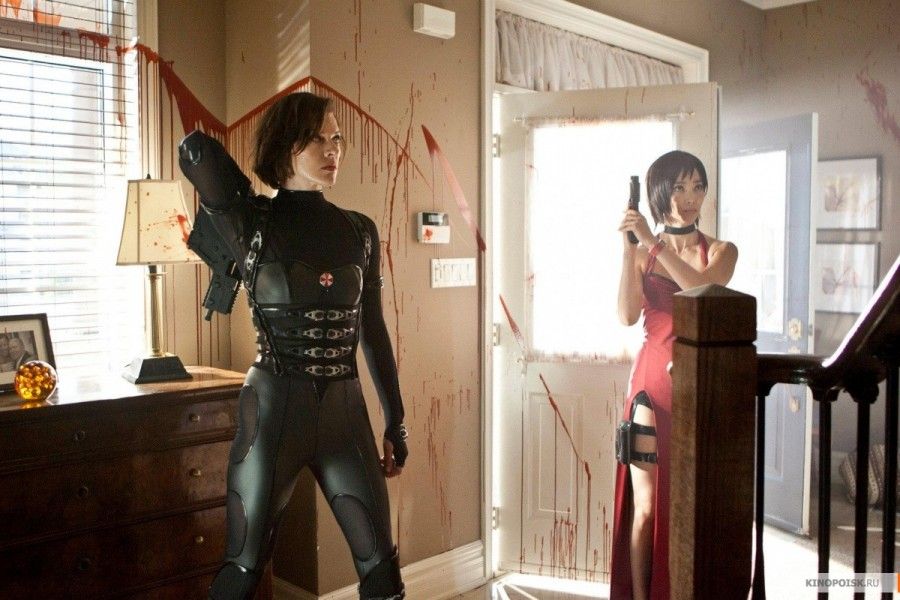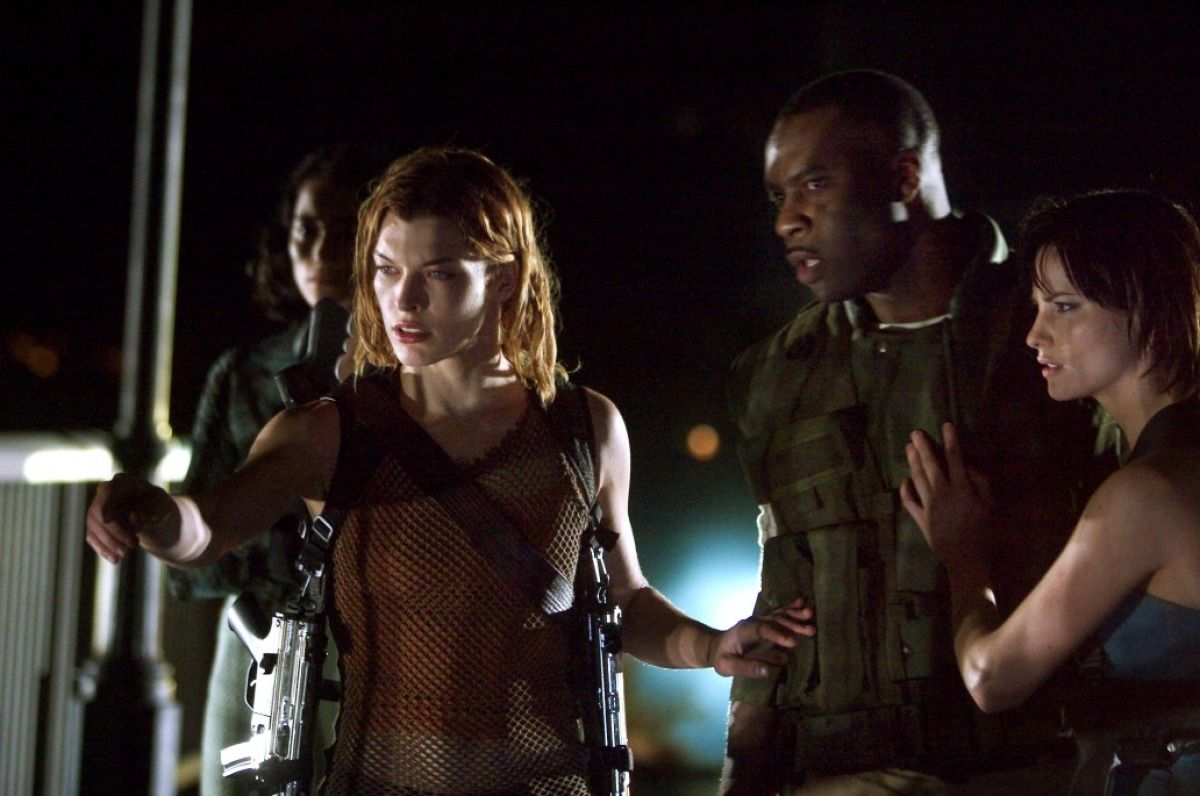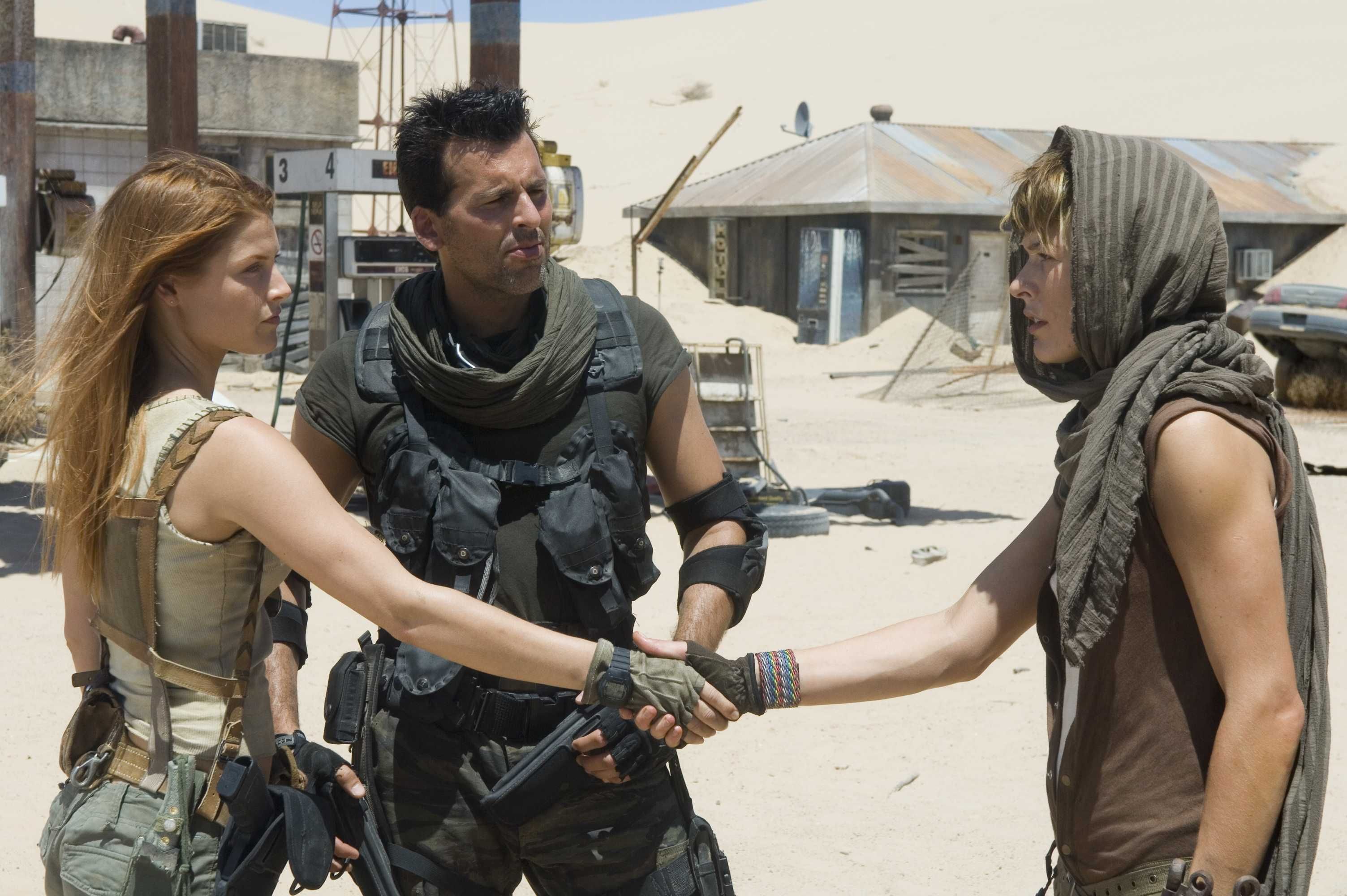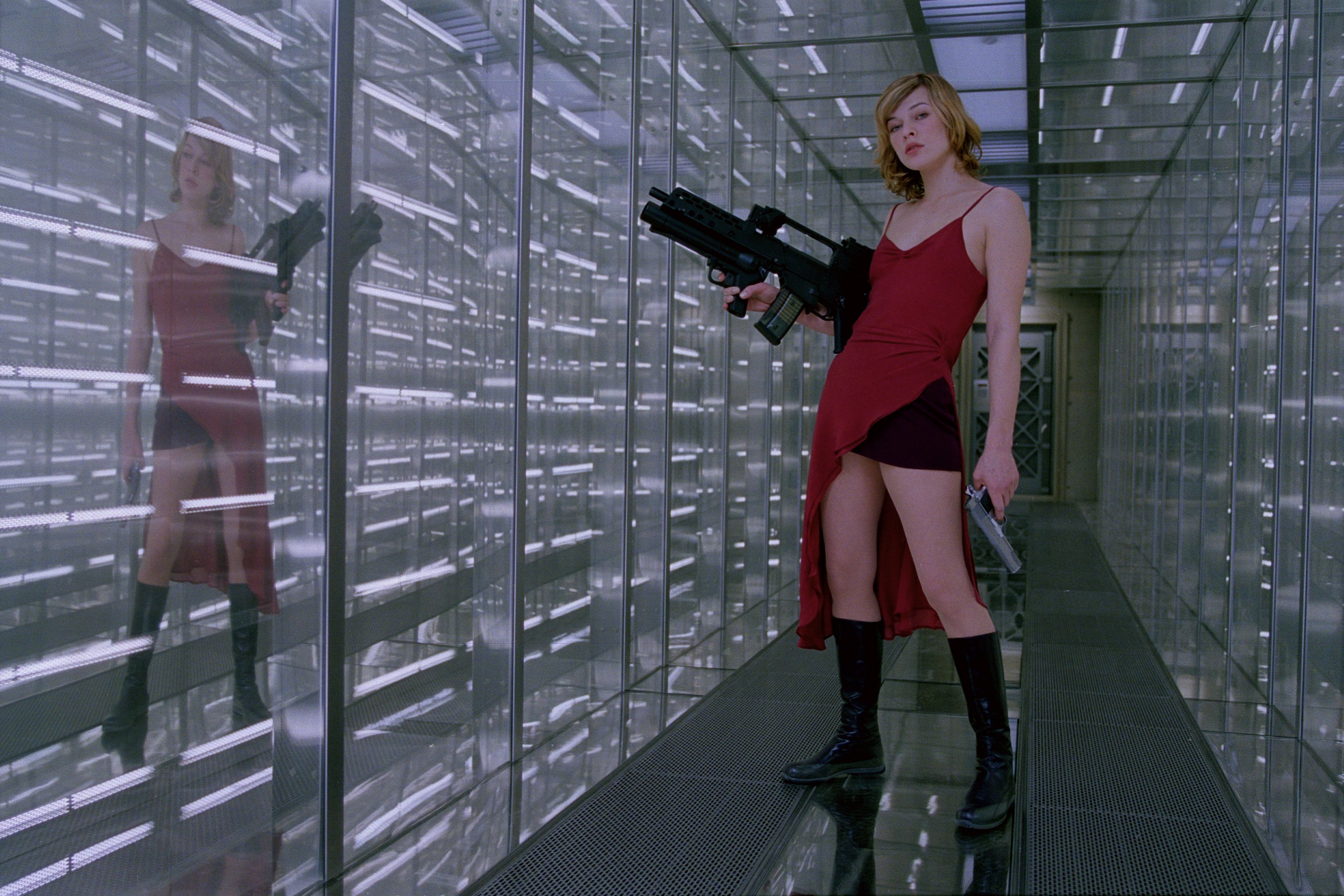Here's the thing. To clarify what everybody already knows, the Resident Evil movies are pretty stupid. They're the epitome of big, dumb popcorn movie fun. I still kind of love them (Well, some of them). It's the "Guilty Pleasure" branch of cinema – big, loud, brassy nonsense that puts a smile on your face. We all probably wish they were a bit better; that there was better character drama to go with the immersive visuals and bonkers action, but the films deserve some credit too.
Not just for the spectacle, but for delivering some good zombie action before it was a commercial craze and for delivering one kickass action heroine after the next. Sure, Alice always has her thighs out for some reason (Alice's Road Warrior garters in Extinction are an all-timer of stupid sexy costuming) and it would be nice to see women with that kind of training dress a bit more tactically, but you'd be hard-pressed to find another franchise that is overflowing with so many female characters who call the shots and save the day. And on a completely shallow note, you'll be hard pressed to find anyone who looks cooler than Jovovich does running full-speed while double fisting shotguns.
But all the grand gunplay and extravagant spectacle of the post-apocalypse is about to come to an end with Resident Evil: The Final Chapter, which lands in theaters this week. Before we get to the end, let's take a look back on all the extreme action and absurd story that brought us to this point, ranked from worst to best. And stay tuned for an updated list after The Final Chapter drops.
5. Resident Evil: Afterlife (2010)
Boring, banal and lethargic, Afterlife is in its own class of bad on the Resident Evil scale. None of these films are a masterpiece, but they’re usually good for a mindless, entertaining romp through the hyperstylized apocalypse. Afterlife fails to deliver even that, with a new cast of almost completely forgettable and unlikeable characters who stumble from one insipid set-= piece to the next. Afterlife heralded the return of Anderson to the director’s chair with disappointing results. As ever, Jovovich is reliably good in action, making each heroic feat look like a graceful magazine spread, but she’s going through the motions in scenes and atmospheres that consistently feel lifted from superior source material. There’s a bit of Dawn of the Dead in the first act, a significant Silent Hill vibe to the middle, and a heavy-handed Matrix riff in the third.
Worse yet, Afterlife feels like a series of missed opportunities. Extinction leaves Alice in command of a clone army, Afterlife wipes them out in the opening minutes. Boris Kodjo’s Luther is the only new non-Redfield character who connects, but he’s left behind for the finale. Most egregiously, Umbrella stooge Albert Wesker (Shawn Roberts) robs Alice of her super strength and psychic powers, but with the exception of one smackdown at Wesker's hands, Alice never seems at any real disadvantage. She leaps off of buildings, dodges bullets, and breaks necks without blinking. Same as it ever was. While there’s a thrill to finally seeing the Redfield siblings together on screen, they don't end up doing all that much together, and it’s not enough to make up for the film's redundant, uninspired action and complete lack of narrative follow through.
4. Resident Evil: Retribution (2012)
If Retribution is nothing but a buffet of lavish set pieces, at least it’s one of those fancy buffets with the crabs legs and top sirloin. Retribution boasts the franchise's most splendid and spectacular set pieces, with a visual flair so strong it seems fully removed from reality. But that's all it boasts. There’s not much in the way of story left to the franchise by the time we get to Retribution. The beloved video game characters have been pushed aside in favor of Anderson’s creation, Alice, and her story never changes all that much from film to film. Alice always follows the same template: Find a team, fight the Umbrella corporation, watch movie of the team die, take the hits, hit back even harder, and look good doing it. And that’s exactly what she does in Retribution, accepting a tacked-on narrative about a daughter that is so disingenuous and unearned, it doesn't sell for a second.
Anderson moves the action from the ravaged wastelands of post-apocalyptic America to Umberlla’s high-tech underground testing facility where anything is possible, and he uses that opportunity to resurrect old fan favorite characters in new and unusual settings. Michelle Rodgriguez's Rain and Oded Fehr’s Carlos return as cloned versions of their former selves, and while they are welcome sights, Anderson fails to give them a story of any merit, so they never become anything more than fan service. Likewise, Jill Valentine is finally back, but she's brainwashed and in boss villain mode, which would be fun if it didn’t last the entire movie. Where Anderson and Retribution excel is the anything-goes action, which is set inside simulators and sterile, fluorescent hallways, making for the most visually impressive and immersive films in the franchise. Retribution makes quick work bouncing from one staggering set piece to the next, each and everyone on full-blast spectacular mode. It's thin, shallow entertainment, but it is something to behold.
3. Resident Evil: Apocalypse (2004)
Apocalypse was the film that finally gave the game fans what they wanted (well, as close as you're going to get in this franchise). Alexander Witt takes over as director for second film, with Anderson remaining on board as screenwriter, and while Apocalypse doesn’t have quite as much style as its predecessor, it’s got a bit more narrative coherence than the films that would follow. Set in Raccoon City during ravages of the T-virus outbreak, Apocalypse finds Alice teaming up with fan-favorite game characters Jill Valentine (Sienna Guillory) and Carlos Oliveira (Oded Fehr) on a mission to survive the zombie-infested streets and bring down Project Nemesis.
The iconic game characters and locations are a welcome addition to the film franchise, giving the audience a few familiar faces to care about in the midst of the constant carnage. While Anderson is always more interested in Alice’s story and her endless war with Umbrella and their twisted genetic mutations, Witt keeps Apocalypse rooted in the zombie genre even as the franchise is clearly veering farther away from horror into pure action/sci-fi territory. Nemesis’ design is a bit tragic and entirely reductive, but Anderson ties it into his Alice narrative in interesting way. Apocalypse is unfortunately undermined by its ending. It's a recurring flaw in the franchise, but perhaps most egregious here where it both deflates the entire film makes for strange connective tissue to the next installment. Apocalypse is the favorite of many game fans, but on its own merit, it's a middling entry.
2. Resident Evil: Extinction (2007)
Highlander helmer Russell Mulcahy steps into the director's chair for Resident Evil’s third installment, working from a script by Anderson. With the Raccoon City survivors living on the road of a T-Virus decimated wasteland, Alice continues her war against Umbrella Corp. while Carlos and L.J. (Mike Epps) team up with video game favorite Claire Redfield (Ali Larter) to protect the ragtag remains of the human race. Larter is a bit miscast in the role, but she’s got great chemistry with Jovovich and she’s always been good at playing strength so it doesn’t take too long to buy into her incarnation of the character. In Resident Evil tradition, the story is undercooked, but in a nice change of pace, Alice knows who she is and she’s fighting for characters she knows and cares about instead of interchangeable innocent strangers, which gives the character dynamics a (slight) bit more weight and intrigue.
As he was in Apocalypse, Carlos is an MVP here and Mulcahy seems to know better what do with his roguish charms, making the character's exit is one of the best moments in the franchise. The mutant animals have never worked as well as the filmmakers seem to think they do, and the murder of murder crows is no exception. Not a lot of people have had luck making birds scary since Aflred Hitchcock and the idea of zombie birds is just kind of inherently silly. However, Anderson's Umbrella arc is particularly twisted in this film, with Iain Glen's nefarious Dr. Isaacs running his brutal experiments on an army of Alice clones. There's some fertile ground there that isn't quite harvested, but it's one of the franchise's nastier and cleverer flourishes. With a likeable team of survivors, some stylish zombie action, and a catchy spin on the overarching villainy of Umbrella's mad scientists, Extinction might be the film that best blends all the franchise's signature elements.
1. Resident Evil (2002)
Fifteen years later, Paul W. S. Anderson’s first film still remains the best in the franchise. Resident Evil gets its strength from the relative simplicity of the concept. Unlike the parade of worldwide carnage and epic stakes that would follow, Resident Evil is tightly contained, both in terms of scope and narrative, within the walls of The Hive. It certainly wasn’t the adaptation game fans were expecting, but Anderson’s spin on the title has a few nods to the source material and enough juice to get past the unfamiliar characters and set up. The most horror-oriented of the films by far, Resident Evil boasts excellent pacing and payoff in the first half, especially once Anderson drops the amnesiac Alice and a team of Umbrella-employed commandos in a house of horrors and slowly turns up the heat.
Anderson constructs a pressure cooker, where each action the team take unleashes a new set of terrors, the best of which are their first encounter with the hordes of reanimated dead they accidentally unleashed and the iconic laser hallway sequence. Unfortunately, all that piqued dread and anxiety evaporates in the second half when The Hive''s bag of tricks tops out with a big sloppy mutant and Anderson reveals his greater ambitions for the saga, but I’ll go to bat for the first hour any day. The team feels like it's made up of actual characters rather than expendable plot points, and Jovovich makes Alice more than an avatar for the audience, even as she struggles to remember who she is. The most important thing Resident Evil has that subsequent films lack in increasing measure is a relatable set of stakes and identifiable rules of the universe, both of which are sacrificed for sense of scope in the sequels, but those details make all the difference when you're dealing in the far-fetched.

